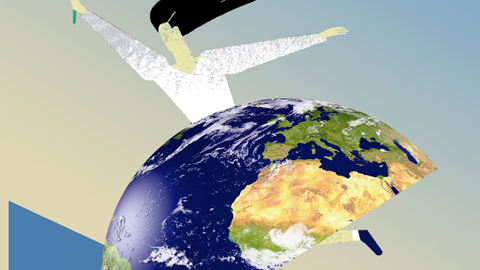Conference on feminist geographies
The UAB Faculty of Philosophy and Arts will play host to the International Conference on Feminist Geographies and Intersectionality: Places, Identities and Knowledges from 14 to 16 July. Some 100 university researchers from all over the globe will meet to discuss gender in the field of geography.

The UAB Geography and Gender Research Group, organiser of this event, aims to make visible the importance of space and time in the lives of women.The UAB will play host to the International Conference on Feminist Geographies and Intersectionality: Places, Identities and Knowledges, taking place from 14 to 16 July. Organised by the Geography and Gender Research Group of the UAB Department of Geography, and sponsored by the Agency for Administration of University and Research Grants (AGAUR), the conference will gather some 100 researchers from around the world to talk about the analysis of gender in the discipline of geography.
The conference is aimed at researchers working from feminist perspectives on gender as well as other identities that play a role in the experience of place: age, social class, ethnicity, sexuality, ability and others.
The conference receives the support of the Gender and Geography Group of the International Geographical Union (IGU), which will celebrate its 33rd World Conference in Beijing at the end of August and aims to make this meeting its "pre-conference".
The conference, which will take place at the Sala de graus of the Faculty of Philosophy and Arts, will begin on Thursday 14 July with the welcoming speech by Shirlena Huang from the Department of Geography of the National University of Singapore; Maria Dolors Garcia Ramon from the Department of Geography at the UAB; and Antoni Durà, Director of the Department of Geography.
The conference will include presentations by Joos Droogleever-Fortuijn, from the University of Amsterdam, who will talk on the "Gender and Intersectionality in Geography Teaching" on Thursday 14 July (10 to 11 a.m.), while on Friday 15 July, Hanna Hamdam-Saliba, PhD in Urbanism and Regional Planning of Palestine/Israel, will give a speech on "The Multiple Power Structure and the Shaping of Arab Women's Spatial Experience in the Urban Space" (10 to 11 a.m.). In the afternoon, Margarida Quierós from the University of Lisbon will speak on "Gendering Smart-Cities: Time-spaces and Places for Feminisms" (2 to 3 p.m.).
During the conference, researchers will participate in different sessions dealing with aspects such as teaching and learning, activism, intersectionality and theory, sexualities, work and gender contracts, identities and representations, planning and policies, masculinities, religions, migrations, methodologies and mobilities.
On Saturday 16 July, the conference will continue at the headquarters of the Institut d'Estudis Catalans, where there will be a debate with several international experts and researchers, coordinated by UAB lecturer Maria Dolors Garcia Ramon (9:15 to 11 a.m.). Following that will be the closing speech by Mireia Baylina, also a UAB lecturer.
A Pioneer Group in Introducing a Gender Approach to Geography
The UAB Geography and Gender Research Group, a study group consolidated in 1987 by Dr Maria Dolors Garcia Ramon, is pioneering the introduction of the gender approach in Catalonia's and Spain's geography. It aims to make visible the importance of space and time in the lives of women, and has worked in several fields of geography, in particular in urban and rural geography, and in the history of geographical thought, always attentive to the interests of researchers and the social context.
The group has worked during years on the Geographies of Infants, Youth and Families, embracing several aspects of the daily life of these collectives such as the use and appropriation of public spaces, the belonging to a place, the search for autonomy, the impact of crisis, the associative network and knowledge of their surroundings, youth, intersectionality of identities and places, youth and geographies of sexuality.
YOU CAN CONSULT THE PROGRAMME HERE